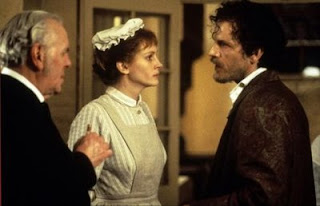 Doubtless it delighted some to find a take on the Jekyll-and-Hyde story from the perspective of a maidservant. Sadly, there the novelty ends.
Doubtless it delighted some to find a take on the Jekyll-and-Hyde story from the perspective of a maidservant. Sadly, there the novelty ends.We're back in good old murderous, noxious Victorian Britain Town (here, intended to be Edinburgh), mostly rendered lifelessly within a single recreated block at Pinewood, which doubtless beats those unauthentic locations in foreign parts like Prague that at least gave films like From Hell, for all its other faults, a headstart on atmosphere. Insert a goodly scattering of big names with various approaches to the thorny issue of accent: Julia Roberts as the title character manages a generic Irish mumble which is dropped when more articulation is required, whereas Glenn Close's brothel-madame cameo opts for Katherine Hepburn after a fight in a gin-palace. Perhaps wisely, John Malkovich doesn't bother at all as the troubled doctor, nor does he think it necessary to depict more than Valmont's cruder cousin as the doctor's alter-ego, who doesn't even credibly scare the bejesus out of Roberts's rabbit in the headlights.
On the side, you always expect Timothy Spall or Jim Broadbent to be lurking in the wings in these films. Here we get Michael Gambon and Michael Sheen instead.
Married to the flat TV photograhy, the LSO widdles gamely along as incessantly as if we were dealing with a silent film. As is usually the case, such Wurlitzery over-compensation cannot hide a script wholly lacking in insight, for all that the new angle adopted might promise.
3/10
